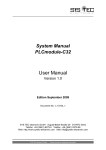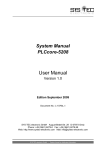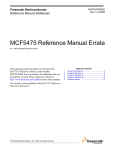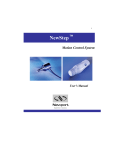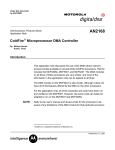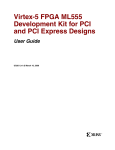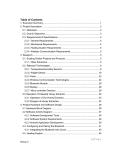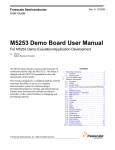Download ECUcore-5484 - Hardware Manual
Transcript
ECUcore-5484 Hardware Manual PCB Version: 4152.3 (PLD) / 4244.0 (FPGA) Edition November 2009 system house for distributed automation ECUcore-5484 Status / Changes Status: released Date/ Version L-1177e_01 L-1177e_02 Section Change initial version FPGA functionality added Editor K.Otto K.Otto © SYS TEC electronic GmbH 2008 L-1177e_02 ECUcore-5484 In this manual are descriptions for copyrighted products, which are not explicitly indicated as such. The absence of the trademark ( ) symbol does not infer that a product is not protected. Additionally, registered patents and trademarks are similarly not expressly indicated in this manual. The information in this document has been carefully checked and is believed to be entirely reliable. However, SYS TEC electronic GmbH assumes no responsibility for any inaccuracies. SYS TEC electronic GmbH neither gives any guarantee nor accepts any liability whatsoever for consequential damages resulting from the use of this manual or its associated product. SYS TEC electronic GmbH reserves the right to alter the information contained herein without prior notification and accepts no responsibility for any damages, which might result. Additionally, SYS TEC electronic GmbH offers no guarantee nor accepts any liability for damages arising from the improper usage or improper installation of the hardware or software. SYS TEC electronic GmbH further reserves the right to alter the layout and/or design of the hardware without prior notification and accepts no liability for doing so. Copyright 2009 SYS TEC electronic GmbH. rights – including those of translation, reprint, broadcast, photomechanical or similar reproduction and storage or processing in computer systems, in whole or in part – are reserved. No reproduction may occur without the express written consent from SYS TEC electronic GmbH. WORLDWIDE Address: SYS TEC electronic GmbH August-Bebel-Str. 29 D-07973 Greiz GERMANY Ordering +49 (3661) 6279-0 Information: [email protected] Technical Support: +49 (3661) 6279-0 [email protected] Fax: +49 (3661) 62 79 99 Web Site: http://www.systec-electronic.com 2rd Edition November 2009 SYS TEC electronic GmbH 2001 L-1177e_02 3 Index of Figures and Tables 1 2 3 4 5 Introduction......................................................................................... 1 Ordering Information and Support .................................................. 3 Properties of the ECUcore-5484 ........................................................ 5 3.1 Overview ...................................................................................... 5 3.2 Block Diagram ............................................................................. 8 Component Descriptions .................................................................. 11 4.1 Pin-header Connection ............................................................... 11 4.2 Jumper Configuration................................................................. 17 4.3 Power Supply ............................................................................. 19 4.4 Reset Characteristics .................................................................. 20 4.5 Chip Configuration after Reset .................................................. 21 4.6 Memory Interface ....................................................................... 22 4.6.1 SDRAM-Bus ................................................................. 22 4.6.2 Flexbus .......................................................................... 22 4.7 Ethernet Controller..................................................................... 23 4.7.1 MAC Address................................................................ 23 4.8 I2C-Module ................................................................................ 23 4.8.1 Real-Time-Clock........................................................... 24 4.8.2 Temperature Sensor ...................................................... 26 4.9 DSPI-Interface............................................................................ 27 4.9.1 EEPROM....................................................................... 28 4.9.2 CAN Interface ............................................................... 28 4.10 Serial Interface ........................................................................... 29 4.11 DMA controller .......................................................................... 30 4.12 BDM/JTAG Port of MCF5484 .................................................. 31 4.13 CPLD.......................................................................................... 32 4.14 FPGA.......................................................................................... 32 Technical Data................................................................................... 33 SYS TEC electronic GmbH 2008 L-1177e_02 ECUcore-5484 Index of figures and tables Table 1: Pinout high density connectors................................................ 13 Table 2: BDM/JTAG module ................................................................ 14 Table 3: Signal description .................................................................... 16 Table 4: Overview of the Solder Jumpers and Default Settings............ 18 Table 5: I2C Components ...................................................................... 24 Table 6: Temperature Sensor Address ................................................... 26 Table 7: SPI Signals............................................................................... 27 Table 8: EEPROM Signals .................................................................... 28 Table 9: CAN Signals ............................................................................ 28 Table 10: UART Signals.......................................................................... 29 Table 11: Timer Signals ........................................................................... 30 Table 12: Technical Data ......................................................................... 33 Figure 1: ECUcore-5484 ........................................................................... 5 Figure 2: Block Diagram ECUcore-5484.................................................. 8 Figure 3: Pinout ....................................................................................... 11 Figure 4: Jumper positions PCB 4152.3 (PLD) ...................................... 17 Figure 5: Jumper positions PCB 4244.0 (FPGA).................................... 17 Figure 6: Physical Dimensions................................................................ 33 © SYS TEC electronic GmbH 2008 L-1177e_02 Introduction 1 Introduction This manual describes the function and technical data for the ECUcore-5484, but not for the microcontroller Freescale Coldfire MCF5484 or any other supplemental products. Please refer to the corresponding manuals and documentation for any other products you may use. Low-active signals are denoted by a „/“ in front of the signal name (i.e. “/RD”). The representation “0” indicates a logical-zero or lowlevel signal. A “1” is the synonym for a logical one or high-level signal. L-1177e_02 © SYS TEC electronic GmbH 2008 1 ECUcore-5484 2 © SYS TEC electronic GmbH 2008 L-1177e_02 Ordering Information and Support 2 Ordering Information and Support Part Number 4001000 4001013 4001015 Version ECUcore-5484, PLD version ECUcore-5484, FPGA ECP2-6 ECUcore-5484, FPGA ECP2-20 The ECUcore-5484 standard version (batch module) features: • Freescale MCF5484 MCU with 200 MHz • 16MiB FLASH • 64MiB DDR-SDRAM • 32kiB EEPROM • CPLD with 320 macrocells (640LUT's) alternatively FPGA with 6000 or 21000 LUT's • Ethernet PHY • Real-Time-Clock • Reset-/Watchdog-IC • Temperature-Sensor • single power supply 3,3V (all other voltages are derived onboard) • ESD Handling Instructions (printed version) You can order a kit with Module and Developmentboard. The Board will provide you for rapid application development. It delivers: • power supply connector 9-24VDC and a external power supply • some Keys and LED's to test IO-functionality, • Connectors for all module-interfaces • USB-Host with 2 Connectors • Ethernet-Switch to duplicate the second Ethernet-Interface • Potentiometer with SPI-ADC and a EEPROM to test SPI • programmable LED-Driver to test I²C • BDM and JTAG-Interfaces • Expansion connector for developing user periphery (a simple IO-Expansion board with 24 keys and 21 LED's is also available - Ord.No. 4004004) L-1177e_02 © SYS TEC electronic GmbH 2008 3 ECUcore-5484 Software Support: • Integrated Development Environment with complete GNU toolchain for M68k architecture • colilo bootloader (pre-installed) • Linux • plc-firmware • CANopen protocol stack (limited function, obj-code library) • CANopen Configuration Suite (Evaluation Version) • CAN-Report CAN-bus monitor (Evaluation Version) • OD-Builder 4 © SYS TEC electronic GmbH 2008 L-1177e_02 Properties of the ECUcore-5484 3 Properties of the ECUcore-5484 3.1 Overview The ECUcore-5484 belongs to the SYS TEC’s ECUcore family. The ECUcore-5484 integrates all elements of a microcontroller system on a board. Due to the most modern SMD packages and by the multilayer design, the module could be manufactured on minimum size. Figure 1: ECUcore-5484 L-1177e_02 © SYS TEC electronic GmbH 2008 5 ECUcore-5484 The dimensions of the board are 70mm x 41,5mm and with two included board connectors it is multifunctional in embedded systems. The ECUcore-5484 includes a Freescale MCF5484 microcontroller. It is a highly-integrated 32-bit microprocessors based on the V4-core of ColdFire microarchitecture. The interconnection to a baseboard is allowed through a pair of highdensity connectors with summary 240 Pin, . The ECUcore-5484 offers the following features: • Internal Features of the Freescale Coldfire MCF5484: o internal 200MHz CPU-clock from external 33-66,67MHz o DDR-/SDR-SDRAM Interface 32kiB Data- / 32kiB Instruction-Cache o 32bit multiplexed address-data bus "Flexbus" for connection of flash and other periphery, usable as 16bit demultiplexed, 6 chip select signals, 33-66MHz, o PCI bus (only usable at PLD-version) o 32kiB SRAM o 2 Fast Ethernet Controller MAC o 2 FlexCAN 2.0B controllers, each with 16 message buffers o I2C o DMA-SPI with 4 (max. 8) chip selects o Watchdog Timer o 2 Periodic Interrupt Timer o 4 General Purpose Timers o Interrupt Controller o 7 external Interrupts (shared with other functionality) o 16-channel DMA o GPIO module o JTAG/BDM module o 388-pin BGA package 6 © SYS TEC electronic GmbH 2008 L-1177e_02 Properties of the ECUcore-5484 • Memory Configuration: o 16MiB Flash-Memory (4-64MiB) o 64MiB DDR-SDRAM (64-128MiB) o 32kiB EEPROM (256Byte – 32kiB) • Communication features: o o o o o o • 4 UART as LVTTL 2 CAN as LVTTL SPI with 8 chip select I²C-Interface 1 Ethernet interface (PHY onboard) 1 Ethernet interface (only MAC) Other Board-Level Features: o CPLD on Flexbus with 640 LUTs and 34 GPIO's o FPGA on Flexbus with 6000 / 21000 LUT's and 80 GPIO's o Reset- and Watchdog-IC or Power Sequencer at FPGA version o Power failure recognition o battery buffered real-time-clock o temperature sensor o JTAG/BDM module o 3.3V operating voltage onboad generated core and ddr-sdram-voltages o Industrial temperature range (-40°C to +85°C) o RoHS compliant L-1177e_02 © SYS TEC electronic GmbH 2008 7 ECUcore-5484 3.2 Block Diagram Powersupply 50MHz Oszillator PLL Vin = 3.3 V Vout = 1.5 V = 2.5 V = 1.25 V Temperatursensor I2C RTC SPI EEPROM 32kByte 2 CAN ETH0 2 Ethernet MAC Coldfire MCF5484 V4-Core 200 MHz PHY Micrel ETH1 GPIOs 4 UARTs Connector PCI-Bus* BDM / JTAG /INT SDRAM-Bus CPLD/FPGA GPIO Flexbus /FB_CS0 DDR SDRAM 64MiB addresslatch NOR FLASH 16MiB AD[31:0], /FB_CS[5:2] BWE[3:0], R/W, OE, ALE, TA Figure 2: Block Diagram ECUcore-5484 *) CPU-PCI-Bus brought out only at PLD-Version 8 © SYS TEC electronic GmbH 2008 L-1177e_02 Properties of the ECUcore-5484 L-1177e_02 © SYS TEC electronic GmbH 2008 9 Component Descriptions 4 Component Descriptions The functions of the on-board components are explained in the following sections. 4.1 Pin-header Connection The ECUcore-5484 has two board connectors. Each of the SMT pin header strips consists of 120 contacts divided into double rows. In total the module has 240 contacts. Separate ground pins in the middle of the connectors provide a large ground connection. In addition to the high density connectors a on-module BDM/JTAG interface of MCF5484 is prepared by pads at the front of the board. 25 23 21 19 17 15 13 11 9 7 5 3 1 1 60 1 60 A B 1 60 1 60 C D Figure 3: Pinout The pitch of the board connectors is about 0,5mm. The header connectors equipped on the ECUcore-5484 are the QTH series provided by Samtec. The series mates with Samtec Products socket series QSH, for example: "QSH-060-01-F-D-A-K". Please refer to the datasheet and their electrical specifications. L-1177e_02 © SYS TEC electronic GmbH 2008 11 ECUcore-5484 The columns A and B representing connector 1. In addition the columns C and D representing connector 2. The following table defines the pinout. Signal Pin Pin Signal Signal Pin Pin Signal PSTD0 PSTD1 PSTD2 PSTD3 PSTD4 PSTD5 PSTD6 PSTD7 SCL SDA PCI_0/IO35 PCI_2/IO37 PCI_4/IO39 PCI_6/IO41 PCI_8/IO43 PCI_10/IO45 PCI_12/IO47 PCI_14/IO49 PCI_16/IO51 PCI_18/IO53 PCI_20/IO55 PCI_22/IO57 PCI_24/IO59 PCI_26/IO61 PCI_28/IO63 PCI_30/IO65 PCI_TRDY/IO67 /PCI_CXBE0/IO69 /PCI_CXBE1/IO71 /PCI_CXBE2/IO73 A01 A02 A03 A04 A05 A06 A07 A08 A09 A10 A11 A12 A13 A14 A15 A16 A17 A18 A19 A20 A21 A22 A23 A24 A25 A26 A27 A28 A29 A30 B01 B02 B03 B04 B05 B06 B07 B08 B09 B10 B11 B12 B13 B14 B15 B16 B17 B18 B19 B20 B21 B22 B23 B24 B25 B26 B27 B28 B29 B30 /RSTI /MR /RSTO /BKPT PSTCLK TCK DSI DSO DSCLK MTMOD0 PCI_1/IO36 PCI_3/IO38 PCI_5/IO40 PCI_7/IO42 PCI_9/IO44 PCI_11/IO46 PCI_13/IO48 PCI_15/IO50 PCI_17/IO52 PCI_19/IO54 PCI_21/IO56 PCI_23/IO58 PCI_25/IO60 PCI_27/IO62 PCI_29/IO64 PCI_31/IO66 /PCI_IRDY/IO68 PCI_PAR/IO70 /PCI_PERR/IO72 /PCI_SERR/IO74 2,5V_EPHY GND Eth0_RX+ Eth0_RXGND Speed PFEC1L0 PFEC1L1 PFEC1L2 PFEC1L3 PFEC1L4 PFEC1L5 PFEC1L6 PFEC1L7 CAN_Rx0 CAN_Tx0 CAN_Rx1 CAN_Tx1 RxD0 TxD0 RxD1 TxD1 /PSC1_RTS /PSC1_CTS SPI_MTSR SPI_MRST /SPI_CS2 /SPI_CS4 /SPI_CS6 /FB_BWE0 C01 C02 C03 C04 C05 C06 C07 C08 C09 C10 C11 C12 C13 C14 C15 C16 C17 C18 C19 C20 C21 C22 C23 C24 C25 C26 C27 C28 C29 C30 D01 D02 D03 D04 D05 D06 D07 D08 D09 D10 D11 D12 D13 D14 D15 D16 D17 D18 D19 D20 D21 D22 D23 D24 D25 D26 D27 D28 D29 D30 GND Eth0_TXEth0_TX+ GND Link/Act PFEC1H0 PFEC1H1 PFEC1H2 PFEC1H3 PFEC1H4 PFEC1H5 PFEC1H6 PFEC1H7 E1MDIO E1MDC nc/PWR_TDI nc/PWR_TDO nc/PWR_TMS RxD2 TxD2 RxD3 TxD3 /PSC3_RTS /PSC3_CTS SPI_CLK /SPI_CS1 /SPI_CS3 /SPI_CS5 /SPI_CS7 /FB_BWE1 12 © SYS TEC electronic GmbH 2008 L-1177e_02 Component Descriptions Signal Pin Pin Signal Signal Pin Pin Signal /PCI_CXBE3/IO75 PCI_IDSEL/IO77 /PCI_STOP/IO79 /PCI_BG0 /PCI_BG1 /PCI_BG2 /PCI_BG3 /PCI_BG4 FB_AD0 FB_AD2 FB_AD4 FB_AD6 FB_AD8 FB_AD10 FB_AD12 FB_AD14 FB_AD16 FB_AD18 FB_AD20 FB_AD22 FB_AD24 FB_AD26 FB_AD28 FB_AD30 FB_R/W VBAT 3,3V 3,3V 3,3V 3,3V A31 A32 A33 A34 A35 A36 A37 A38 A39 A40 A41 A42 A43 A44 A45 A46 A47 A48 A49 A50 A51 A52 A53 A54 A55 A56 A57 A58 A59 A60 B31 B32 B33 B34 B35 B36 B37 B38 B39 B40 B41 B42 B43 B44 B45 B46 B47 B48 B49 B50 B51 B52 B53 B54 B55 B56 B57 B58 B59 B60 /PCI_DEVSEL/IO76 /PCI_FRAME/IO78 /PCI_RESET/IO80 /PCI_BR0 /PCI_BR1 /PCI_BR2 /PCI_BR3 /PCI_BR4 FB_AD1 FB_AD3 FB_AD5 FB_AD7 FB_AD9 FB_AD11 FB_AD13 FB_AD15 FB_AD17 FB_AD19 FB_AD21 FB_AD23 FB_AD25 FB_AD27 FB_AD29 FB_AD31 /FB_OE 3,3V 3,3V 3,3V 3,3V 3,3V /FB_BWE2 /FB_CS2 /FB_CS4 FB_ALE /FB_TA /DACK0 /IRQ5 /IRQ7 TOUT0 TOUT1 TOUT3 IO1 IO3 IO5 IO7 IO9 IO11 IO13 IO15 IO17 IO19 IO21 IO23 IO25 IO27 IO29 IO31 IO33 PLD_TMS PLD_TCK C31 C32 C33 C34 C35 C36 C37 C38 C39 C40 C41 C42 C43 C44 C45 C46 C47 C48 C49 C50 C51 C52 C53 C54 C55 C56 C57 C58 C59 C60 D31 D32 D33 D34 D35 D36 D37 D38 D39 D40 D41 D42 D43 D44 D45 D46 D47 D48 D49 D50 D51 D52 D53 D54 D55 D56 D57 D58 D59 D60 /FB_BWE3 /FB_CS3 /FB_CS5 /DREQ0 /BOOT PFI /IRQ6 TIN0 TIN1 TIN3 IO0 IO2 IO4 IO6 IO8 IO10 IO12 IO14 IO16 IO18 IO20 IO22 IO24 IO26 IO28 IO30 IO32 IO34 PLD_TDI PLD_TDO Table 1: Pinout high density connectors When two pin assignments at pin then first is for module with PLD and second for module with FPGA. L-1177e_02 © SYS TEC electronic GmbH 2008 13 ECUcore-5484 The following table shows the BDM/JTAG layout with pin names. Signal Pin Pin Signal not connected 1 2 /BKPT GND 3 4 DSCLK GND 5 6 TCK /RSTI 7 8 DSI 3,3V 9 10 DSO GND 11 12 PSTD7 PSTD6 13 14 PSTD5 PSTD4 15 16 PSTD3 PSTD2 17 18 PSTD1 PSTD0 19 20 GND not connected 21 22 not connected GND 23 24 PSTCLK not connected 25 26 /FB_TA Table 2: BDM/JTAG module The following table defines the function of signals. Most modul pins have the same name like the IC-Pin. So you can find in the relevant datasheet additional informations about the functionality. Signal Function (alternate function) PSTD0..PSTD7 /BKPT PSTCLK TCK DSI DSO DSCLK BDM/JTAG-Interface of MCF5484 MTMOD0 /RSTI /MR /RSTO SCL SDA PCI_0..AD31 PCI_TRDY /PCI_IRDY PCI_PAR /PCI_PERR /PCI_SERR /PCI_CXBE0..3 /PCI_DEVSEL /PCI_FRAME 14 signal to choose between BDM and JTAG mode Reset output of Reset/Watchdog-IC Manual Reset input of Reset/Watchdog-IC Reset output of MCF5484 I²C interface PCI-Bus Dir On-board usage (only MCF5484signals) Transmitter /Receiver MCF5484 I I/O I O I/O I/O pulldown (low = BDM mode) Reset input of CPU, Flash, PLD, Eth-PHY pullup MCF5484 Reset-IC Reset-IC MCF5484 Temperature sensor, RTC MCF5484 MCF5484 © SYS TEC electronic GmbH 2008 L-1177e_02 Component Descriptions Signal Function (alternate function) Dir PCI_IDSEL /PCI_STOP /PCI_RESET /PCI_BG0..4 PCI-Bus / GPIO I/O /PCI_BR0..4 PCI-Bus / GPIO I/O FB_AD0..AD31 FB_R/W /FB_OE FB_ALE /FB_BWE0..3 /FB_CS2..5 /FB_TA Flexbus address/data Flexbus read/write Flexbus output enable Flexbus address latch enable Flexbus byte write enable Flexbus chip select Flexbus transfer acknowledge I/O O O O O O I Eth0_TX+, TXEth0_RX+, RX2,5V_EPHY Link/Act "LED0" Speed "LED1" Ethernet interface0 (PHY) O I O O O PFEC1L0..7 PFEC1H0..7 E1MDIO E1MDC Common voltage of interface0 Link/Act Indicator interface 0 Speed Indicator interface 0 Ethernet Interface 1 (MAC) MII- or 7Wire-Interface / GPIO Ethernet Interface 1 Ethernet Interface 1 On-board usage (only MCF5484signals) Transmitter /Receiver MCF5484 /PCI_BR4 is default used as /INT-signal from PLD to CPU MCF5484 Flash, PLD MCF5484 onboard LED Ethernet PHY Micrel KS8721BL IO MCF5484 I/O O nc no function (faulty USB Device interface) I/O MCF5484 CAN_Rx0, Rx1 CAN_Tx0, Tx1 CAN-Interface LVTTL-Level I O MCF5484 RxD0..3 TxD0..3 UART0..3 LVTTL-Level I O MCF5484 /PSC1_RTS /PSC1_CTS handshake signals of UART1 / GPIO /PSC3_RTS /PSC3_CTS handshake signals of UART3 / GPIO SPI_MTSR SPI_MRST SPI_CLK /SPI1..7 DSPI interface /PFI signal on /DACK1 to determine the boot-sequence (to colilo or Linux) power fail input of reset-ic /DREQ0, /DACK0 DMA controller / GPIO /BOOT L-1177e_02 © SYS TEC electronic GmbH 2008 I/O onboard pullup 4,7k and Switch 1-1 to GND MCF5484 I/O MCF5484 O /CS demux ICr I pullup (4,7k) and switch (S1-2) to GND pullup 4,7k to 3,3V MCF5484 Reset-IC I/O 15 ECUcore-5484 Signal Function (alternate function) Dir On-board usage (only MCF5484signals) Transmitter /Receiver /IRQ7 /IRQ6, 5 Interrupt input (NMI) Interrupt input / GPIO I I/O pullup 4,7k MCF5484 TIN0..1 TIN2..3 TOUT0..1 TOUT2..3 Timer input Timer input / GPIO Timer output Timer output / GPIO I I/O O I/O IO0..80 GPIO (depends on pld-configuration) I/O PLD_TMS PLD_TCK PLD_TDI PLD_TDO PLD JTAG interface PWR_TMS PWR_TDI PWR_TDO PowerSequencer JTAG interface VBAT 3,3V Buffer supply for RTC (3,3V) power supply of module Table 3: 16 MCF5484 PLD I I RTC Signal description © SYS TEC electronic GmbH 2008 L-1177e_02 Component Descriptions 4.2 Jumper Configuration On default the jumpers are configuered for a prperly function of module. Change positions only if you really need it in a special application ! Read user manual of MCF5484 for the boot and resetconfiguration before you change the configuration jumpers J1-J6 ! The following figure shows the positions of jumpers. All placed on top-side of module. J201 J17 Pin1 J6 J5 J4 J3 J2 J1 Pin1 Pin1 J7 ON S1 Figure 4: Pin1 1 2 J8 Jumper positions PCB 4152.3 (PLD) J6 J5 J4 J3 J2 J1 R453 J17 Pin1 Pin1 J7 S1 1 2 Pin1 J8 Figure 5: Jumper positions PCB 4244.0 (FPGA) L-1177e_02 © SYS TEC electronic GmbH 2008 17 ECUcore-5484 The function of S1 depence on application. Read the manual of software for further informations. The following table lists each solder jumper and its function on the ECUcore-5484. Jumper Jumper Pad Setting 2-3 (default) J1 1-2 2-3 (default) J2 1-2 1-2 default J3 2-3 2-3/1-2/1-2 (default) J4/J5/J6 Signal FB_AD2 FB_AD3 FB_AD5 FB_AD9/10/11 other J7/J8 2-3/2-3 MTMOD0 1-2 J201 (PLD module only) 18 /PSC1_CTS 2-3 default J17 Table 4: 1-2/1-2 (default) 1-2 (default) 2-3 EEPROM-/WP PLD_IRQ Function FB_CS0 enable autoacknowledge disable BWE/BE configured as /BWE BWE/BE configured as /BE BWE/BE3..0 used as BWE/BE BWE/BE3..2 used as TSIZ1..0 BWE/BE1..0 used as FB_AD1..0 together with AD8=1 and AD12=0 FB_AD12..8 = 00011 = ext.50MHz , int. 100MHz, core 200MHz not possible with the oscillator S1-1 switches /PSC1_CTS (onboard pullup) to GND S1-1 switches MTMOD0 (onboard pulldown) to 3,3V read/write operations are possible depence on WPEN-Bit write operations are inhibited /IRQ-signal of PLD is connected to /PCI_BR4 (=/INT4 of CPU) connected to TIN3 (=/INT3 of CPU) Overview of the Solder Jumpers and Default Settings © SYS TEC electronic GmbH 2008 L-1177e_02 Component Descriptions 4.3 Power Supply The ECUcore-5484 must be supplied with an input voltage of +3.3VDC. The typical current consumption is approximately 600mA. The 3,3V supplys directly: • MCF5484 IO voltage • CPLD/FPGA • Flash • RTC, Temperaturesensor, EEPROM • Logic So be carefully and provide a good voltage with low tolerance and low ripple. See "Technical Data" for detailed informations. The rise time of power on ramp of 3,3V should be slower than 1µs (for MCF5484) and faster than 30ms (CPLD-requirement). The onboard switching regulators generate all the other needed voltages. These are: • 1,5V for MCF5484 core, core-pll, usb-pll supply • 2,5V for DDR-SDRAM supply • 1,25V for DDR-SDRAM reference • 1,2V for FPGA Core supply A Reset-IC watches the voltages 2,5V and 1,5V and reset's the board if one voltage dropes below 0,7V. The 3,3V will be watched too, and a reset is occured if this voltage dropes below 3,08V. For FPGA a PowerSequencer is needed. It watch all voltages and realized the power on sequence for FPGA. Other functions are reset, watchdog and power fail function. L-1177e_02 © SYS TEC electronic GmbH 2008 19 ECUcore-5484 4.4 Reset Characteristics Basically the reset characteristics are defined by the EXAR Supervisory Circuit SP706T, which is responsible for generating the system reset signal /RSTI. For FPGA-version the functionality of reset-ic is implemented in power-sequencer. The reset in signal (/RSTI) is low-active and connected to a pull-up resistor. It is asserted by the following parameters: • • • Power Supply Voltage VCC drops below 3.08V Manual Reset (/MR) voltage drops below 0.6V WDI pin: no signal shift occurs within a timespan of 1.6s An internal timer releases /RESET after 200ms. When a brownout condition occurs in the middle of a previously initiated reset pulse, the pulse continues for at least another 140ms. As soon as reset is released and WDI is driven HIGH or LOW, the timer will start counting. Pulses with a minimum pulse width of 50ns can be detected. The Reset-IC has a build in watchdog timer. During reset the watchdog timer will stay cleared and will not count. It will started when the coldfire-pin /PSC0_RTS (used as watchdog trigger) left the tristate-state and drives a high or low. Then this pin must toggle into 1,6sec. to trigger the watchdog. The output is coupled with /RSTI by Diodes. The Power Fail Input signal (PFI) is connected to PFI-input of ResetIC with an 4,7k pullup. It can be switched externaly by open-collector or LVTTL output. The detection of power fail should be near the power supply input of the device (e.g. the 24VDC supply). So you can use a longer time to save critical data or send messages about the error. To connect the signal /PFO of Reset-IC to external interrupt /INT6 close the soldering jumper R408 (R453 on FPGA version) with 0R. Default the Resistor is open and the /INT6 can used as GPIO or for other interrupt sources. You can find the resistor-pads at Pin 5 of SP706T on the bottom side of module. 20 © SYS TEC electronic GmbH 2008 L-1177e_02 Component Descriptions 4.5 Chip Configuration after Reset The Chip Configuration will be read on Flexbus-pins at reset FB_AD12..FB_AD0. Don't drive this signale by external IC's during the reset-state. Generaly make shure that the bus devices only drives if her chip-select is activated by Coldfire. See Chapter "Jumper Configuration" Table "Overview of the Solder Jumpers and Default Settings" for default configuration. Jumpers are mounted with 4,7k-Resistors. The configuration is chose to support the onboard Flash and PLD with following features: • portsize for /CS0 (Flash) is 16Bit • autoacknowledge for /CS0 is enabled • BWE3..0 of /CS0 is only asserted for write cycles • Flexbus is used for both address and data (PCIbus can completely used separate) • /BE/BWE3..0 is used as byte/byte write enable • clock ratio is configured for external 50MHz oszillator, internal 100MHz clock and core 200 MHz clock L-1177e_02 © SYS TEC electronic GmbH 2008 21 ECUcore-5484 4.6 Memory Interface The external memory interface of the MCF-5484 is divided into external SDRAM and Flexbus. For data storage a eeprom is used connected to SPI-bus. External SDRAM and Flexbus are 2 separate bus-systems with different portpins on MCF5484. Flexbus is used onboard for Flash and PLD an accessible on board-connector. SDRAM-bus is only used onboard. 4.6.1 SDRAM-Bus The SDRAM-bus supports SDR-SDRAM and DDR-SDRAM. Onboard two 16bit DDR-SDRAM's mounted, accessible as one 32bitdevice. Addressing is realized with /SD_CS0. Default RAM-Types are "Micron MT46V16M16BG-75" or compatible with 32MiB each and 7,5ns cycle time. 4.6.2 Flexbus Flash-Memory: Flexbus is connected to Flash via address latch for demultiplexed address bus. One Flash-IC with 16bit data-bus is mounted. Default Flash-Type is "Spansion S29GL128N10" with 16MiB and 100ns cycle time. Used Flexbus control signals: /FB_CS0, /FB_OE, FB_R/W, FB_ALE PLD/FPGA: For fast accessing the PLD the flexbus is using too. The complete address/data bus pins of MCF5484 are connected to PLD. Demultiplexing can be effect in PLD. Used Flexbus control signals: /FB_CS1, /FB_OE, FB_R/W, FB_ALE 22 © SYS TEC electronic GmbH 2008 L-1177e_02 Component Descriptions 4.7 Ethernet Controller The MCF5484 supports two 10/100 Ethernet channels by internal MAC with MII-interface. For the first channel a on-board PHY chip KSZ8721BLI from Micrel realized a 10/100 physical interface. Board connector signals are: Signal description Eth0_Tx+ Tx+ from PHY Eth0_TxTx- from PHY Eth0_Rx+ Rx+ from PHY Eth0_RxRx- from PHY 2V5_EPHY 2,5V PHY-Supply Link/Act output for LED (parallel a yellow LED is mounted on board with 270R) Speed output for LED Tx and Rx Signals are pulled up with 49,9R to 2,5V-EPHY. The second MII-interface is brought out to board connector. The MII-Interfaces defaults to GPIO after reset. The GPIO module must be configured to enable the peripheral function of the appropriate pins prior to configuring the Fast Ethernet Controller. 4.7.1 MAC Address SYS TEC electronic has aquired a pool of these MAC addresses. The MAC address for the first Ethernet-Interface Eth0 is barcode-labelled attached on the ECUcore-5484. 4.8 I2C-Module The ECUcore-5484 features one I2C interface, a 2-wire serial bus used for communication with I2C devices. The bus is brought out via the board connector. The ECUcore-5484 comes with two on-board I2C devices. Please refer to the table below. L-1177e_02 © SYS TEC electronic GmbH 2008 23 ECUcore-5484 I2C device Real-Time-Clock Epson 8564JE (U201) Temperature Sensor TI TMP101 (U202) Table 5: Address 0xA2 0x90 (default) 0x92 upon request I2C Components The I2C-Module defaults to GPIO after reset. The GPIO module must be configured to enable the peripheral function of the appropriate pins prior to configuring the I2C-Module. 4.8.1 Real-Time-Clock The ECUcore-5484 is equipped with a Real-Time-Clock to manage real-time application. The device offers functions such as calendar clock, alarm and timer. It also outputs pre-defined frequencies (32.768kHz, 1024Hz, 32Hz, 1Hz) via the CLKOUT pin. RTC Characteristics: • • • Built-in crystal running at 32768Hz programmable alarm, timer and interrupt functions low power consumption: o Bus active: o Bus inactive, CLKOUT inactive: 1mA 1µA The Real-Time-Clock is supplied by 3.3V DC. If the system voltage crashes, the backup battery supplies the RTC (if connected!). Device Address: • • 24 0xA2 when write mode 0xA3 when read mode © SYS TEC electronic GmbH 2008 L-1177e_02 Component Descriptions The Pin CLKOE is pulled high. So the clock output can be enabled by setting the bit 'FE' in Register 'Clock Out frequency' to 1. One of the output-pins of RTC can connect to CPU-pin '/DREQ1_/IRQ1'. resistor function (when R equipped) R15 (default equipped) CLKOUT is connected to /IRQ1 R16 (default open) /RTC_INT is connected to /IRQ1 At module with FPGA both signals are connected to FPGA-Pins and can be used in Software. L-1177e_02 © SYS TEC electronic GmbH 2008 25 ECUcore-5484 4.8.2 Temperature Sensor The ECUcore-5484 disposes of an optional temperature sensor TMP101 to record ambient temperatures to, e.g, enable protection from overheating. The ECUcore-5484 just provides the physical connection between the CPU and the sensor. The communication or any protective measures are software functions to be provided by the user application. The address is adjustable by a resisitor. The following table shows the various assembly options. resistor equipped (default) not equipped (upon request) Table 6: ADD0 signal Address 0 (GND) 1001000x = 0x90 float 1001001x = 0x92 Temperature Sensor Address Temperature sensor characteristics: • • • Temperature resolution of 0.0625°C Temperature range of -55°C to +125°C Alert pin as interrupt source if temperature exceeds defined limits The Alert-Pin is connected to CPU-Pin '/PSC0_CTS' and must be polled to indicate temperature-exceedings. 26 © SYS TEC electronic GmbH 2008 L-1177e_02 Component Descriptions 4.9 DSPI-Interface The ECUcore-5484 allows high-speed serial communication with SPI devices such as EEPROM. The DSPI bus signals are brought out via the board connector. An onboard 3-to-8 decoder provides up to 8 SPI chip select signals of which one is reserved for use with EEPROM and 7 are available via the board connector. Addressed-decoding: DSPI_CS pins of CPU CS0 CS2 CS3 CS5 0 0 0 1 0 0 0 0 1 0 0 0 0 1 0 0 1 1 0 0 0 0 1 0 1 0 1 0 1 1 0 0 1 1 1 0 decoder chipselect low activ no chip select /CS-EEPROM /SPI_CS1 /SPI_CS2 /SPI_CS3 /SPI_CS4 /SPI_CS5 /SPI_CS6 /SPI_CS7 The following table shows the SPI signals available. SPI signal (on CPU) Description /SPI_CS1-7 Chip Select's on connector SPI_MTSR (SOUT) Master Transmit Slave Receive SPI_MRST (SIN) Master Receive Slave Transmit SPI_CLK (SCK) Clock Table 7: SPI Signals The DSPI module defaults to GPIO after reset. The GPIO module must be configured to enable the peripheral function of the appropriate pins prior to configuring the DSPI module. L-1177e_02 © SYS TEC electronic GmbH 2008 27 ECUcore-5484 4.9.1 EEPROM The ECUcore-5484 has an EEPROM for data storage. In standard version the EEPROM provides 32kiB (Typ ATMEL AT25256A). The following table shows the pinout connection. Signal EEPROM SO SI SCK /CS Signal MCF5484 PSPI_MRST PSPI_MTSR PSPI_CLK PSPI_/CS0 /WP Jumper J17 /HOLD N.C. Table 8: Description Serial Output EEPROM Serial Input EEPROM Clock EEPROM Chip Select EEPROM Write Protect EEPROM for data protection 1: normal read/write (default) 0: write protect is active connected to high, Suspends Serial Input, is not supported EEPROM Signals 4.9.2 CAN Interface The MCF5484 includes 2 CAN interfaces. The 2 channels are brought out via the board connector as LVTTL-interface. The CPU provides different Pins for CAN. The default connection is: CAN-Signal CANRX0 CANTX0 CANRX1 CANTX1 Table 9: Pin MCF5484 /PSC2CTS /PSC2RTS TIN2 TOUT2 Connector-Pin CAN_Rx0 (X400/C15) CAN_Tx0 (X400/C16) CAN_Rx1 (C400/C17) CAN_Tx1 (X400/C18) CAN Signals Externaly an 3,3V CAN-Transceiver can directly connected to CANPins. Alternatively a galvanic decoupled CAN-Interface can build to save the module. Drive Capability of CAN output pins is 8mA. 28 © SYS TEC electronic GmbH 2008 L-1177e_02 Component Descriptions 4.10 Serial Interface The ECUcore-5484 supports up to 4 independent UARTs available on the board connector. They are used to interface serial communication via RS232 or RS485 level signals. Each interface has two handshakesignals (RTS/CTS), but not all are supported on module. The following table shows the pinout. Signals are LVTTL. However, the board does not provide any transceiver. Signal MCF5484 PSC0TXD PSC0RXD /PSC0CTS Signal Connector TxD0 RxD0 N.C. N.C. /PSC0RTS PSC1TXD PSC1RXD /PSC1CTS /PSC1RTS PSC2TXD PSC2RXD /PSC2CTS /PSC2RTS PSC3TXD PSC3RXD /PSC3CTS /PSC3RTS Table 10: TxD1 RxD1 PSC_IO2 PSC_IO3 TxD2 RxD2 CAN_Tx0 CAN_Rx0 TxD3 RxD3 PSC_IO6 PSC_IO7 Comment used as WDI for onboard Watchdog-IC used for Temperature-Sensor INT-Pin used as second Boot-Signal with pullup (4k7) and DIP-Switch 2 to GND (s.a. Jumper J8) when CAN0 not needed this Pins can be used for PSC2-Handshake GPIO's can be used for PSC3-Handshake UART Signals The UART-Modules default to GPIO after reset. The GPIO module must be configured to enable the peripheral function of the appropriate pins prior to configuring the UART module. L-1177e_02 © SYS TEC electronic GmbH 2008 29 ECUcore-5484 4.11 DMA controller There are two external DMA-Interfaces on MCF5484 consist of DMA-acknowledge-Pin and DMA-request-Pin. Only one interface is provided by module as default. Signal MCF5484 /DREQ0 /DACK0 Signal Connector /DREQ0 /DACK0 /DREQ1 /IRQ1 /DACK1 /BOOT Table 11: comment default onboard connected to RTC-CLKOUT via 0R-Resistor or to FPGA onboard connected to Boot-Switch (DIP-Switch 1) with pullup 4k7 Timer Signals To find more informations about DMA as Communication Subsystem see the user manual of MCF5484. 30 © SYS TEC electronic GmbH 2008 L-1177e_02 Component Descriptions 4.12 BDM/JTAG Port of MCF5484 The ECUcore-5484 provides a BDM/JTAG interface for the CPU MCF5484. This is for debugging on low level software and programming the CPU of raw module. In default the module will distributed with a bootloader to download software over ethernet or RS232. BDM/JTAG is accsessible over board connector. The ECUcore-5484 has a specific BDM/JTAG pinout on the short side of the board. Here a debug-adapter (e.g. BDM Adapter from P&EMicrocomputer Systems) can directly be plugged. So you can get a debug-module for target environment, without BDM-connectors on baseboard. The function BDM or JTAG is selectable with Signal MTMOD0 on board-connector or on DIP-SW1 (not default, see description J7/J8). The MTMOD0-Pin has a 4k7 pulldown on board. MTMOD0 0 (default) 1 function normal and Background Debug Mode (BDM) normal and JTAG mode Some of the BDM/JTAG Pins has a 4,7k pullup or pulldown resistor on board: resistor signal pullup /BKPT, DSI, DSO, DSCLK pulldown TCK L-1177e_02 © SYS TEC electronic GmbH 2008 31 ECUcore-5484 4.13 CPLD A second JTAG-Port is brought out on the board connector for programming the CPLD. All Pins has on bord 10k pullup or pulldown resistors. resistor pullup pulldown signal PLD_TDI, PLD_TDO, PLD_TMS PLD_TCK PLD-JTAG-signals are onboard connect to MCF5484. So Modules with Linux supports programming of CPLD from CPU and don't need external programming devices for PLD. The Lattice CPLD Type MachXO640 with speed grade '-3' is used. 4.14 FPGA FPGA is used to provide more functionality. There are more IO-Pin's and Gates in the FPGA for more flexibilty. This make it possible e.g. to realize more than one 32bit counter-inputs and pulse-outputs. The PCI pins at connector would changed in FPGA-IO-Pins. So there are 80 FPGA-IO's for various functions. SPI /CS-generation like chapter 4.9 is implemented in FPGA. SPI-MRST, MTSR and CLK are connected to the FPGA too. So it can be assigned to any othe IO-Pin. Other way is to implement a external SPI-unit in FPGA to release the cpu from SPI-communication. For faster signal handling the cpu-interrupt-pins IRQ1, 3, 4 and 6 are connected to FPGA. The Lattice Type "LFE2-6SE-5FN256I" or "LFE2-20SE-6FN256I" are used. Programming of FPGA is the same like PLD. 32 © SYS TEC electronic GmbH 2008 L-1177e_02 Technical Data 5 Technical Data The physical dimensions of the ECUcore-5484 are shown in the figure below. 41.5mm 2.5mm 2.5mm 70mm 35.05mm 2.5mm 36.9mm 4.55mm ECUcore-5484 2.5mm 31.05mm Figure 6: Physical Dimensions The height including board connector and components is about 9mm. The thickness of the PCB is about 1.6mm. The maximum component height on top is about 2,55mm. dimensions weight operating temperature storage temperature operating voltage current consumption I/O-Level Table 12: 70mm x 36,9mm x 7,8mm approximately 21g -40°C to +85°C -40°C to +85°C +3.3V DC ± 5% typ. 600mA +3.3V DC ± 5% Technical Data L-1177e_02 © SYS TEC electronic GmbH 2008 33 ECUcore-5484 34 © SYS TEC electronic GmbH 2008 L-1177e_02 Suggestions for Improvement Document: Document number: Hardware Manual ECUcore-5484 L-1177e_02, Edition November 2009 How would you improve this manual? Did you find any mistakes in this manual? Submitted by: Customer number: Name: Company: Address: Return to: SYS TEC electronic GmbH August-Bebel-Str. 29 D-07973 Greiz GERMANY Fax : +49 (0) 36 61 / 62 79 99 L-1177e_02 © SYS TEC electronic GmbH 2008 page Published by © SYS TEC electronic GmbH 2008 Ord. No. L-1177e_02 Printed in Germany











































